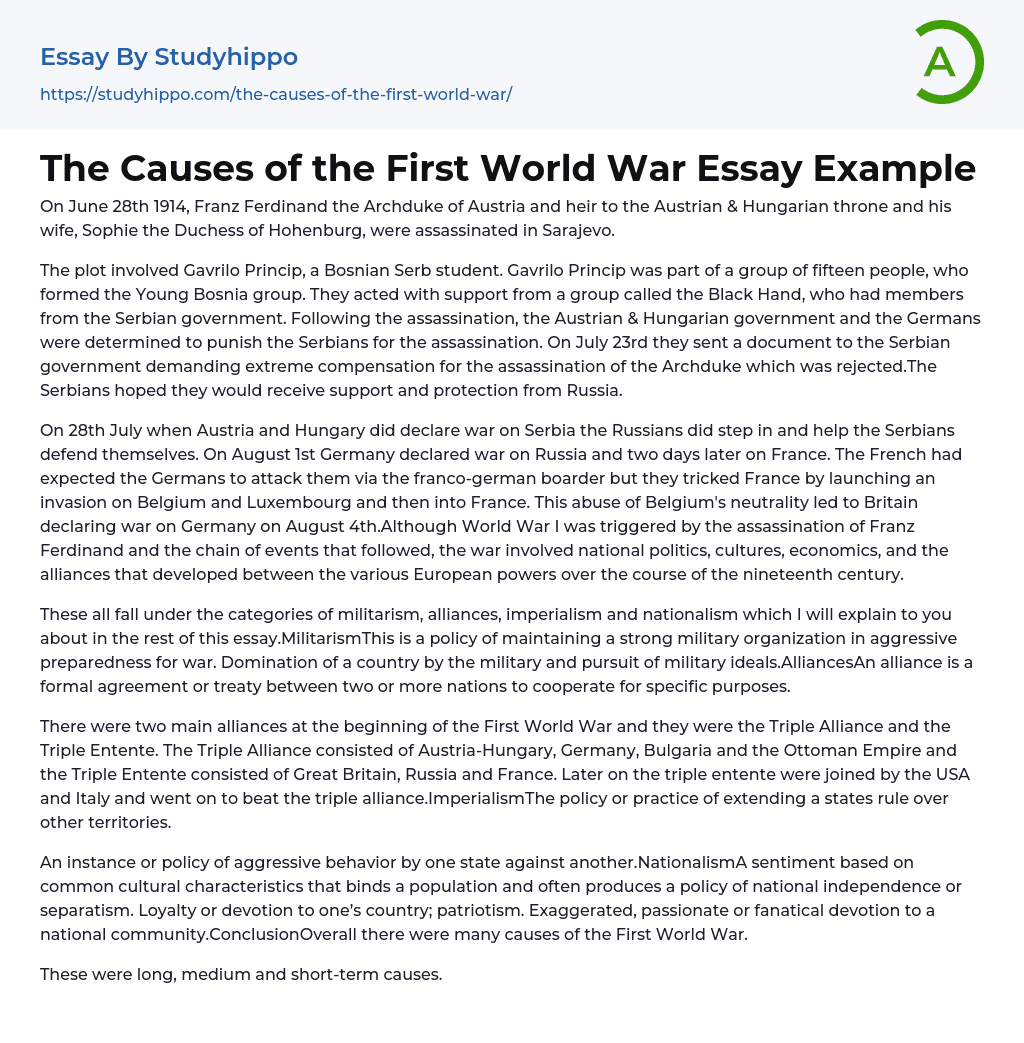The assassination of Franz Ferdinand, the Archduke of Austria and heir to the Austrian & Hungarian throne, and his wife, Sophie the Duchess of Hohenburg, took place on June 28th 1914 in Sarajevo.
The story centers around Gavrilo Princip, a student from Bosnia and a member of the Young Bosnia group, which consisted of fifteen people. The group received assistance from the Black Hand, which had members in the Serbian government. The assassination of the Archduke Ferdinand led to the Austro-Hungarian and German governments vowing to punish the Serbians. A document was sent to Serbia on July 23rd demanding extreme compensation for the assassination, but it was rejected. The Serbians hoped for support and protection from Russia.
When Austria and Hungary declared war on Serbia on 28th July, Russia aided the Serbians. On August 1st, Germany declared war on Russia and two days lat
...er on France. France anticipated the Germans to attack them from the franco-german border but instead the Germans deceived France and attacked Belgium and Luxembourg before invading France. The exploitation of Belgium's neutrality resulted in Britain declaring war on Germany on August 4th. Despite the fact that the assassination of Franz Ferdinand was the triggering event for World War I, the war was influenced by national politics, cultures, economics, and alliances that had developed between European powers throughout the 19th century.
Within this composition, I will address four primary classifications: militarism, alliances, imperialism, and nationalism. The term militarism denotes a strategy of upholding a potent military establishment in forceful anticipation of war. This can encompass the control of a nation by the military and an aspiration toward military principles. Conversely, an
alliance is an official accord or contract between two or more countries to collaborate for particular objectives.In World War I, there were two main alliances: the Triple Alliance (Austria-Hungary, Germany, Bulgaria and the Ottoman Empire) and the Triple Entente (Great Britain, Russia and France). The Triple Entente ultimately won with assistance from Italy and the United States. Imperialism refers to a state's expansion of control over other territories.
Aggressive behavior by one state against another, also known as Nationalism, is a sentiment that binds a population based on common cultural characteristics and often leads to a policy of national independence or separatism. It also involves loyalty or devotion to one's country and patriotism, which can turn into an exaggerated, passionate, or fanatical devotion to a national community. In conclusion, the First World War had many causes.
After researching nationalism, imperialism, and militarism, it's clear that they were all contributing factors to the tension buildup over the past century, resulting in long, medium, and short-term causes of the First World War. The assassination of the archduke ultimately ignited the conflict, with alliances causing other countries to join in and further escalate the war.
- Berlin essays
- Pompeii essays
- Paris essays
- Athens essays
- Belgium essays
- England essays
- Germany essays
- Greece essays
- Ireland essays
- Italy essays
- London essays
- Russia essays
- Spain essays
- United Kingdom essays
- Great britain essays
- Rome essays
- British essays
- Birmingham essays
- Culture essays
- Social Control essays
- Citizenship essays
- Social Justice essays
- Caste System essays
- Social Responsibility essays
- Socialization essays
- Deviance essays
- Modern Society essays
- Popularity essays
- Civil Society essays
- Community essays
- Female essays
- Filipino People essays
- Igbo People essays
- Indigenous Australians essays
- Indigenous Peoples essays
- Minority Group essays
- Social Institution essays
- Men essays
- The nation essays
- Middle Class essays
- Social Norms essays
- Discourse Community essays
- Popular Culture essays
- Car Culture essays
- American Culture essays
- Mormon essays
- Indian Culture essays
- Mexican Culture essays
- Pop Culture essays
- Cultural Differences essays




